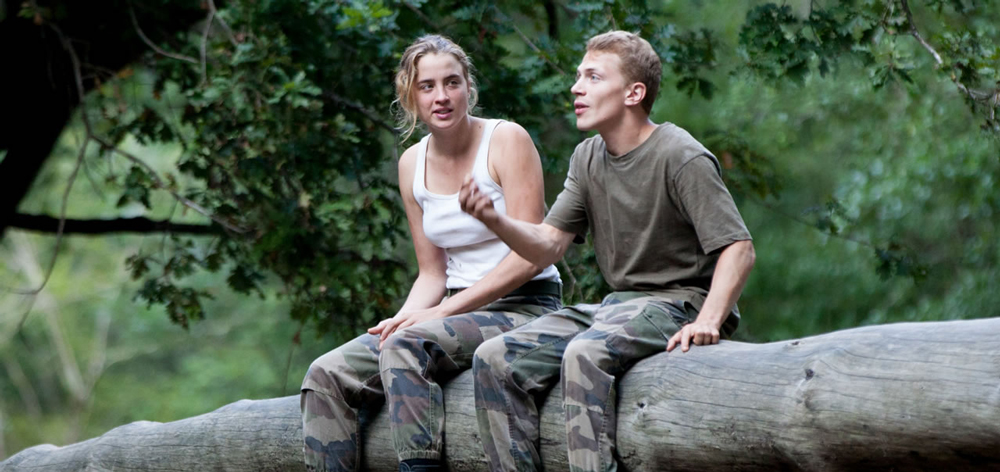
Starting a movie with a scene where two brothers build their father’s coffin doesn’t sound like a joyous cinematic experience. Thankfully, the much-lauded Love at First Fight (Les Combattants) is quite different from any kind of po-faced family drama, as well as whatever twee nonsense you might expect from that cutesy English title.1 As Arnaud (Kevin Azais) helps his older brother (Antoine Laurent) create the box they’ll bury their father in, Thomas Cailley (the film’s director, co-writer and cinematographer) has the camera pan smoothly along buzz saws and the boys’ gliding hands, and scores it to one of the most jubilant opening music stings in recent memory, all to imbue it with a near-fetishistic efficiency. This, he declares in that moment, is not a story about their grief. It’s not even about that of their mother (Brigitte Roüan), since she gets her own cutaway where she nods approvingly at what they’re doing. It’s about Arnaud becoming slowly motivated into blueprinting his impending adulthood, which is something marginally more complicated than the shelter he’s supposed to be building for his family’s construction business.
He is pulled into this by one particularly strong magnet: Madeleine, an aspiring soldier played with ironclad focus by Adele Haènel. As the two get to know each other, he is drawn to her aspiration to join an elite platoon within the French defense force, and soon finds himself signing up to join her in the absence of any other satisfactory plan for his own life. The fun part is that it’s the kind of film that won’t dare state such character motivations openly. Contrary to the verbosity of most “smart” rom-coms, the two lovers/fighters here never talk in naked wit about their own feelings, even when there’s nothing to do but talk. There are plenty of tangential asides where their relationship grows − particularly as they while away the hours in their sleepy town with dumb friends − which causes them to fixate firmly on outside obsessions rather than themselves. When they start to influence each other – Arnaud finding discipline to centre himself, Madeleine finding a space to contemplate – it speaks for itself and makes the movie’s heart beat strong.
In sketching this relationship, Cailley’s nous for the oddities of everyday life becomes clear. We see these in soft gags that hilariously dress down the hollow survivalist regime they’ve attached themselves to, by revealing the childish naivete of the personnel there. One sergeant feels the need to tell Madeleine and the two other female recruits that he wants no sex to take place while they’re there, in such a dead-serious tone that you can’t help but feel sorry for him. The other soldiers also barely have a clue what values they’re subscribing to; when their officer throws dummy grenades, their awkward dog-piling to cushion the “explosion” is done more out of hapless obedience than self-sacrifice, which makes the pretension of valour in their surroundings come crashing down. Besides being hysterically funny, it is a sincere dilemma that Arnaud and Madeleine slowly overcome, brushing aside ersatz heroism until they have only each other to find a future in.
That partnership isn’t always supported both ways, though. Azais is unbelievably comfortable on-screen, but his laid-back attitude can feel ineffectual at times, especially when Haènel busts a gut to portray her character’s wound-tight sensibility.2 There’s always a fun energy, though, thanks to a warm visual style (courtesy of Paul Chappelle on production design) that is remarkably consistent, even as they sojourn to the rugged wilderness. Musical trio Hit N Run also have plenty more surprises where the opening coffin number comes from, giving even the most mundane army proceedings some inexplicable, infectious disco rhythm with their soundtrack. In this way, the central relationship’s room for improvement is swiftly filled by a delightfully blunt tone — achieved both by Cailley and through editing by Lilian Corbeille — making it a romp throughout.
In line with its beguiling character dynamics, the film makes a similarly understated go at subtext, within the same natural spaces Arnaud and Madeleine try to tame. She, and in turn he, busy themselves with learning how to fend for themselves in case of an impending apocalypse. This is yet another through-line that could easily be insufferable, but in Cailley’s hands it becomes an absorbing parallel for the young-adult tension between enjoying creature comforts of the present and making hard, discomforting steps for a better future. Their superiors at the camp barely have a grip what they’re doing, and the resultant fear and doubt within the two leads steadily gathers steam towards a surreal, ghostly climax that successfully plays out the man-versus-wild parallel. More than a safe, awards-garnering quirk, Cailley has made a cunning coming-of-age tale that drinks up the absurdities of young adulthood and does a glorious spit-take.
